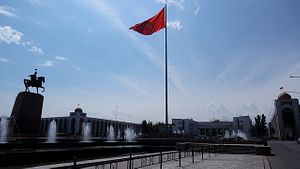Two weeks after a shocking, but ineffective, suicide attack on the Chinese Embassy in Bishkek, a complex international narrative has emerged.
Kyrgyz authorities say that an ethnic Uighur carrying a pair of Tajik passports drove a van laden with TNT into the embassy compound on August 30. Only the driver died in the attack, while three Krygyz employees of the embassy were injured.
According to the Kyrgyz authorities, the attack was planned by Syria-based Uighur militants–members of the East Turkestan Islamic Movement (ETIM)–and paid for via a tour company in Istanbul. Five Kyrgyz nationals have been arrested in connection to the attack. Last week, according to 24.kg, one of the men named as a suspect distanced himself from the allegations. Mubarak Turganbaev, a Kyrgyz citizen living in Turkey and reportedly wanted by Kyrgyz authorities, wrote on Facebook, “I don’t have anything common with the terrorists.”
Turganbaev, an employee of the Adal tour company, wrote, “Our company operates like a bank.” The company, he wrote, ships cargo between Turkey and Kyrgyzstan and also handles remittances. He wrote that on July 1 a man in Istanbul asked to transfer $5,000 to someone in Bishkek. “He gave me the money, and our employees in Bishkek gave the same amount to the guy named Iskender.” The employees who handed over the money in Bishkek, he wrote, have been arrested.
Russian authorities recently added a new layer, with Deputy FSB head Sergei Smirnov, according to RIA news agency, saying that a joint investigation with the Shanghai Cooperation Organization (SCO), indicated the involvement of people linked to Russia, China and Tajikistan in the attack.
Smirnov said there were “Tajik, Chinese and Russian traces behind the terrorist attack.”
The extent of these traces, and that of SCO involvement, is not completely clear. There are the Tajik passports reportedly held by the attacker, the Chinese embassy target and Uighur connection, and the trend of Central Asians being recruited into Syrian militant groups while working in Russia. As Joshua Kucera, writing for EurasiaNet, points out, Smirnov’s comments were made during an SCO meeting in Almaty. The SCO coordination mentioned by Smirnov was likely in reference to the individual member states’ security services rather than a stricture of the SCO itself.
The attack on the Chinese embassy is noteworthy for the target and the tactic. While a handful of Chinese officials have been attacked over the years in Kyrgyzstan, this seems to be Bishkek’s first suicide attack. It was an eminently ineffective terrorist attack: no one but the attacker died. That said, the impact has been large. Hundreds in Bishkek–Kyrgyz and third-country nationals alike–are stalled in Kyrgyzstan waiting for Chinese visas while the embassy has been closed. If the Uighur connection is confirmed, it marks a tangible expansion of China’s Xinjiang problems into Central Asia–something both China and the Central Asian states can ill-afford.































